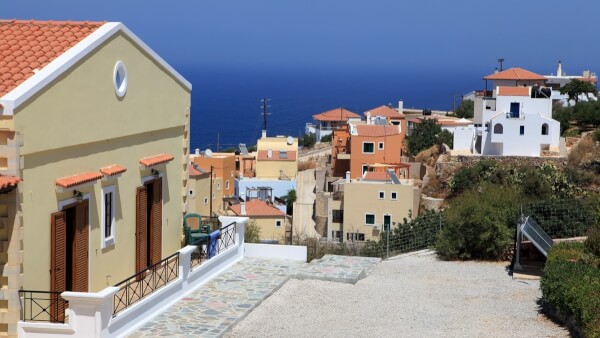How much does it cost to build a house in Poland?
How much does it cost to build a house in Poland as a UK expat? Find out in our essential guide, covering everything you need to know.

Who wouldn’t want to live in Italy? The incredible food and wine may be the main attraction for you, or the warm, Mediterranean climate. Whether you’re drawn to Italy’s beautiful countryside, its sparkling Riviera coastline or one of its vibrant, historic cities - there’s something here for everyone.
Italy isn’t all sunshine and pasta, though. If you’re thinking about buying property in Italy, or are already in the process of doing so, you’ll need to wrap your head around Italian property taxes.
Whether you’re an Italian citizen, expat or simply a UK resident looking for a holiday home - there’ll be a number of bills to pay the government. Here’s your essential guide to paying property tax in Italy in 2021-2022.
Generally speaking, property tax is any tax paid on real estate. It can be split into two broad categories - sales taxes, which are one-off costs paid when a property changes hands, and maintenance taxes. This second type of property tax is paid regularly by the owner or occupier.
Italy has its fair share of both sales and property taxes. There are also likely to be a number of other fees that come into play when buying or selling property.
Taxes form a substantial part of costs associated with buying and maintaining a property.
The main sales taxes in Italy are as follows:
And the maintenance taxes are:
All these taxes are explained in detail below.
Buyers pay the majority of sales taxes in Italy, although sellers may have to pay capital gains tax as well as VAT on some fees. Maintenance taxes are generally in the hands of the owner.
There are no restrictions on foreigners buying property in Italy, but all property owners need to pay taxes.
Italian property taxes for foreigners tend to be higher in some categories, and also vary depending on other factors such as:
Before looking at property taxes in Italy, it’s important to familiarise yourself with the concept of ‘cadastral value’ (valore catastale)
Every property is given an official valore catastale based on a valuation by the local council or comune. It’s drawn up based on the size, location and quality of the property, and will also vary according to whether the property is used as a main residence or a second home.
The valore catastale usually ends up being lower than the real sale or market value price of the property.
If you’re buying a property in Italy, you’ll be responsible for the majority of the sales taxes. It’s important to factor all of these into your overall budget, to avoid any unpleasant surprises later on.
Let’s take a look at each of the initial property taxes in Italy in more detail:
What tends to be called stamp duty in English is imposta di registro in Italian. In a nutshell, this is a tax on registering a property.
See the table below for a full breakdown of these costs.
| Purchase details | Registration tax |
|---|---|
| Buying a new build property | None - pay VAT instead |
| Buying non-luxury property as main residence | 3% |
| Buying second/holiday home or investment as a non-resident | 7% |
| Buying land to build on | 8% |
| Buying agricultural land | 10% |
Known as IVA in Italy, value-added tax is payable on some of the fees involved with property sales. If you’re buying from a private seller who isn’t registered for IVA, you won’t need to pay this tax⁴.
But if you buy your property from an IVA-registered company or property developer, the following tax rates will be payable:
| Purchase details - buying from a IVA-registered company | IVA/VAT rate |
|---|---|
| Buying your first home as a resident | 4% |
| Buying a property as a second home, or as a non-resident | 10% |
| Buying a property classed as a ‘luxury’ home | 22% |
You may also have to pay VAT on estate agency and legal fees when buying property in Italy.
The Italian plusvalenza tax is equivalent to capital gains tax on property sales. It’s a tax paid on profits over a certain threshold made from selling a property.
Unlike other one-off property taxes in Italy that are payable when a house is sold, maintenance taxes are ongoing charges that all property owners must pay.
There are two main types of annual property tax in Italy you need to know about - IMU, and waste collection tax. Here’s a little more info on each:
The principal maintenance tax in Italy is known as Imposta municipale unica, or IMU.
TARI is another Italian maintenance tax, this time for waste collection. This covers the cost of services like rubbish collection and street cleaning.
This is just a selection of the other fees you’ll face when buying, selling or maintaining a property in Italy. The whole set of fees will vary from case to case.
The notary (notaio) is a crucial figure in Italian property transactions, facilitating the entire sale and working with both buyer and seller. They take a fee of around 1% - 2.5%.
Both the buyer and the seller generally have to pay the estate agent. The fees are around 1.5% to 4% on each side, plus VAT in most cases.
You may face a range of other fees, especially at the buying stage. For example, you could rack up legal fees, costs for technical reports and surveys, and additional registration fees. You’ll also have to pay for a translator if your Italian is a little rusty.
Here are a few cases where you might be able to pay less tax:
The notary is the person to talk to about sales fees, or your conveyancing solicitor. They should be able to give you a schedule.
For maintenance fees, mostly they're due twice a year, in June and December. Confirm with your local council, and mark your diary - as you might not get a reminder through the post.
Some regular bills in Italy are most often paid through the post office, and this includes the maintenance taxes on your property. Check with your local bank branch to see if online payments or direct debits are possible.
The notary, or your solicitor or accountant, should be able to talk you through paying other fees.
For some of the fees you’ll face when paying for your Italian property, you’ll probably be able to make online payments. However, you’ll need to check whether you can pay from an international account or if you’ll need to make the payment from an Italian bank account.
Either way, you’re likely to need to move a substantial amount of your money into Italy, whether it initially goes into your account, or straight to the government or an estate agent. When this happens, it’s really important to check you’re getting the best possible rate on the transfer.
Many banks and traditional money transfer services tend to mark up the currency exchange rate, meaning that less of your money makes it to its destination. But Wise always gives you the mid-market rate - the only fair exchange rate there is - and only charges a small fee, always stated clearly upfront.
A multi-currency account from Wise makes things even easier, allowing you to hold money in 50+ different currencies, including euros - so you can send and receive money without having to worry about the exchange rate at all.
Taxes are always complicated, whether you’re buying a house or getting a job. And if you’re operating internationally, things can get very complicated indeed. That’s why it’s important to know what you have to pay, and when - and how to make the payments in the most efficient way.
Hopefully, after reading this guide, you should have a much better idea of how property tax in Italy works. Good luck with your property purchase!
Sources used for this article:
Sources checked on 22-Oct-2021.
*Please see terms of use and product availability for your region or visit Wise fees and pricing for the most up to date pricing and fee information.
This publication is provided for general information purposes and does not constitute legal, tax or other professional advice from Wise Payments Limited or its subsidiaries and its affiliates, and it is not intended as a substitute for obtaining advice from a financial advisor or any other professional.
We make no representations, warranties or guarantees, whether expressed or implied, that the content in the publication is accurate, complete or up to date.

How much does it cost to build a house in Poland as a UK expat? Find out in our essential guide, covering everything you need to know.

How much does it cost to build a house in Greece as a UK expat? Find out in our essential guide, covering everything you need to know.

Read our comprehensive guide to buying a house abroad, including how to arrange finance for overseas property purchases.

Read our roundup of 8 of the best places to buy land in the world as a Brit, looking at average land prices, buyer’s costs and more.

Read our guide to selling property in India and bringing money to the UK, covering taxes, transfer methods and other essential information.

Read our essential guide to investing in US farmland from the UK, including rules on foreign land ownership, average prices per acre, and much more.